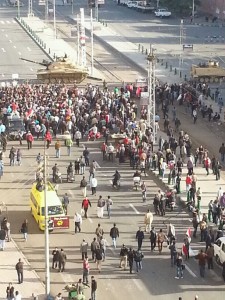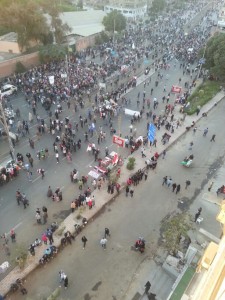3:10 PM

3:10 PM Protestors are beginning to gather after friday prayers in front of the barricade set up by the Republican Guard.
4:29 PM

At 4:30 pm marches from areas around Roxy Square begin to arrive from Khalifa Ma’moun St.
Shortly after, my neighbor, who has a bird’s eye view of Merghany St. and the Executive Palace, sent out this tweet:
Protesters at prez palace going ape shit after pathetic incomprehensible speech by #mubarak… i mean #morsi pic.twitter.com/fCbnM7qj
— Mai Sirry (@maisirry) December 6, 2012
Social media went crazy, friends in various places around Cairo reported that once apathetic citizens were now up in arms. From my living room it all felt just way too familiar.

Feb. 2, 2011 Former President Hosni Mubarak attempts to regain the support of the people after deadly clashes break out in and around Tahrir Square.

Dec. 6, 2012 – President Mohamed Morsi, in his first address to the nation since deadly clashes broke out in front of the Heliopolis based Executive Palace.
Images stick with people. While they may not know how or why something looks familiar, their subconscious will trigger a very negative feeling. By only changing the backdrop from blue (tranquility and peace) to red (anger and authority), President Morsi seems to be showing more force than his predecessor.
Not to mention, body language says it all. The only hand gestures he used throughout his speech were choppy, indicating authority. When he made eye contact, he was frowning, with the right side of his face angled down. No reassurances there.
There seems to be an issue with the Arabic language in the Executive offices of the Middle East. During the first six months of the Arab uprising, i was working with the investigative unit at the ABC News offices in New York City. I was tasked with live translating all official speeches from Arab world , which was a serious challenge. Mubarak continuously ignored grammatical laws and made up words. At first, my insecurities allowed me to believe that it was my lack of language skills that made me unable to understand parts of the speech, but I quickly learned, it’s not me, it’s them.
Last night was no different. I sat on my couch with friends that were born and raised in Egypt, and had an extremely strong grasp of the Arabic language. I kept geting confused, but was reassured when I saw they were equally flabbergasted. Then, during the speech he spoke of article 6, and that his intention behind the article was to make clear and ” أعنون “… 2o3anwen….
Wait… that’s not Arabic.. that’s Arab dictator speak for: I’m so powerful I can make up my own language.
Authority and power that is wielded with a voice that shouts often is another common trait between Egyptian dictators. During his speech, just as with Mubarak’s last few addresses, his tone is a mix of angry baba when you come home late from curfew and angry professor when you forget to do your assignment.
This type of tone is noninclusive, and doesn’t open the mental door of participation and working together. But, it does galvanize supporters and polarize people.
Perhaps President Morsi should be given a pass on all the visuals and underlying tones of a speech. He didn’t have much to learn from and everyone is going through a learning process. However, his use of the same vocabulary as his predecessor, and ignoring the opposoition in the same way will only serve to destroy any support he may have.
Here’s a couple places where he went wrong:
1. Morsi: The violence started on Tuesday December 4. I attended the protests on that day. I was intimidated at first by the numbers I knew would be standing right behind my house. But, I got home from my office in Downtown in less than 20 minutes, parked my car in front of my house, attended almost two hours of the protest and came home without ever feeling frightened. I was not harassed, there was no violence and the people seemed to be in generally good spirits, positive about their ability to participate in political protests.
The next day, however, I could cut the tension with a knife. I couldn’t park in front of my building (which turned out to be a blessing in disguise), and feared for my safety in the 10 minute walk from my car to my building through MB territory. Over 6 hours I watched a battle rage under my house.
2. Morsi: Baltagiya (thugs) have turned peaceful protests violent, and they were paid to do it per their own confessions: Right after the president’s speech Yosri Fouda hosted two females who had been taken by the Muslim Brotherhood on the night of Dec. 4. Ola Shabah’s face was so badly bruised she couldn’t see out of her left eye, and Lena Mujahid, who had obviously sustained injuries to her face and body. Both say they were immediately asked who they were working for and taken into questioning about their involvement with a paying force. They didn’t have proof, they were creating proof. Luckily both girls were saved.
The same tactic of divide by spreading fear in the streets was used by Mubarak. It also serves to paint parts of the opposition as deserving of a swift and violent punishment, while allowing the dictator to appear open to the idea of dialogue.
3. Disregard protestors demands as incorrect, yet call for open dialogue. Perhaps Morsi is more guilty of this than Mubarak. Mubarak recognized that a force was against him, spoke about it and then called for dialogue. Morsi, on the other hand, disregarded all of the demands, reaffirmed the decisions that brought people out to the streets in the first place and then asked for an open dialogue.
Egypt is in dire need of a leader that can unite its different layers and people to work together for better social, political and economic systems. Last night’s speech was indicative of a president who is comfortable with his party’s approval, and apathetic about the country’s needs. It was Mors’s address to HIS nation, not the Egyptians.
A link to a 14 minute excerpt of the speech: